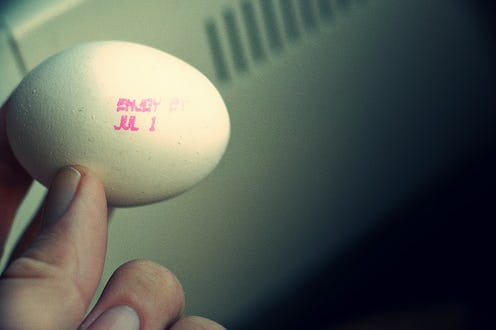Life
7 Foods To Never Eat Past The Expiration Date

We’ve all been there — you’re in your refrigerator looking for something to eat, and come across food you forgot you even purchased. The food is a little past its expiration date, but appears free of mold and rancid smells. Unfortunately, looks and smells can be deceiving. There are some foods you should never eat past the expiration date, like fresh meat, seafood, produce, eggs, and dairy.
Typically, the more refined and processed a food item is, the longer its shelf life. Fresh and minimally processed foods do not have this luxury, and must be eaten by their expiration dates to pose less of a health risk to consumers. That means the week-old pint of blueberries sitting in the back of your fridge has got to go.
That being said, it can be tricky deciphering food labels. “Sell by” or “best by” dates refer to the quality of the product, and not food safety. In fact, sell by dates and expiration dates are not regulated nor required by the Food and Drug Administration, with the exception of infant formula.
Regardless of the date, it’s important to properly store and handle perishable foods. Items left out for more than two hours at room temperature can become hazardous to eat, even if the expiration date is days away. Refrigeration can stop bacteria growth, and freezing food can stop bacteria from growing all together, so make sure you are storing your food properly.
When it comes to food safety, it's always best to play it safe — because food poisoning is not sexy. Here are seven specific food items you should never eat past the expiration date.
1. Deli Meat
So, about listeria. Listeria is a bacteria that thrives in soil, water, and in some animals. It can also be found at food processing plants, where deli meat and other processed meats, like hot dogs, get cooked and packaged. Unlike other bacterias, listeria can multiply in cold environments (i.e. your fridge). It's best to toss opened deli meat after three to five days in the fridge. If you haven't opened it, throw it away after two-weeks.
2. Eggs
We all know what a rotten egg smells like, but how can you tell with an un-cracked egg? Easy! See if it floats in a bowl of cold water. Fresh eggs will sink to the bottom, while rotten eggs will float on top. As an egg ages, fluid evaporates through the porous shell, while air and gasses penetrate in. As a rule of thumb, keep eggs no longer than five weeks after purchasing.
3. Fresh Berries
Picture this — you know you have a carton of strawberries in the back of the fridge just waiting to be devoured. Unfortunately, microscopic mold spores have taken a bite first, and have turned your berries into fuzz and mush. To delay the growth of mold, wash berries right before you consume them. Otherwise, fresh berries can be consumed up to three days in the refrigerator.
4. Mixed Greens
Prepackaged salad mixes may be a convenient way to eat your greens, but they can harbor dangerous bacteria from process and handling contamination. Obviously, severely wilted and slimy greens are a no go, but unopened lettuce can only last three to five days past its sell-by date.
5. Raw Seafood
Fresh fish and shellfish should be eaten within two days of purchase, and kept in the refrigerator. If you plan on eating the seafood past those days, wrap it tightly, and store it in the freezer for up to six months, depending on its fat content. Oily fish, such as salmon and tuna, can turn rancid if not stored properly.
6. Raw Meat
Beware of the pink slime. Foul smells and a slimy appearance are key indicators that your ground meat has gone bad. Raw ground meat, including poultry, can be refrigerated for up to two days, per the U.S. Department of Agriculture. Roasts, steaks, and chops can be kept in the refrigerator for up to five days. Frozen meat can be stored up to four months.
7. Soft Cheese
The shelf life of cheese depends on a number of factors, including the type of cheese, the processing method, and its exposure to heat. Hard and semi-hard cheeses like Parmesan and cheddar will last longer than semi-soft and soft cheeses such as Monterey Jack and Brie. Stored in the refrigerator, opened hard cheese varieties will last between three and six weeks, while opened soft cheese varieties will last for a week.
Images: David Goehring , Ranjit Bhatnagar , Chotda , jayneadd , Nieri Da Silva, Jay Davis , Arnaud Paillard, thr0ke/Flickr